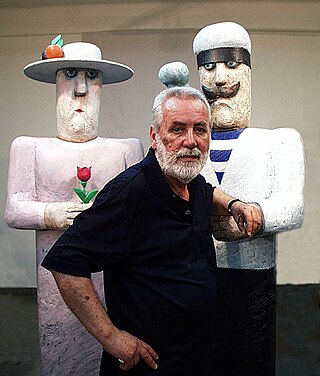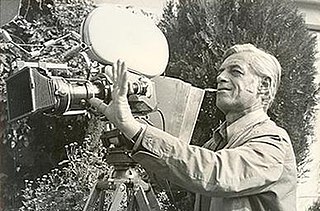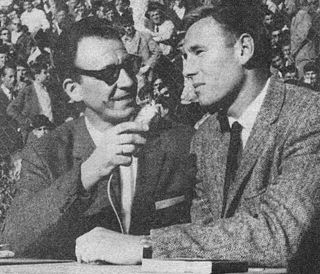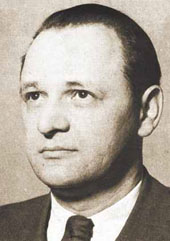
Culture of Croatia has historically been influenced by Central European, Mediterranean and Balkan cultures. Croatia's unique culture and identity can be traced back to the historical llyricum. The Croatian language is believed to have been formed in the 6th or 7th century, and the written language is present in Glagolitic texts from the 11th century.

Rade Šerbedžija is a Croatian actor, director and musician. He is known for his portrayals of imposing figures on both sides of the law. He was one of the best known Yugoslav actors in the 1970s and 1980s. He is internationally known mainly for his role as Boris the Blade in Snatch (2000), his supporting roles in such Hollywood films as The Saint (1997), Mission: Impossible 2 (2000), X-Men: First Class (2011), Harry Potter and the Deathly Hallows: Part 1 (2010), and Taken 2 (2012); and for his recurring role as former Soviet Army General Dmitri Gredenko in Season 6 of TV action series 24.

Miroslav "Ćiro" Blažević was a Bosnian-Croatian professional football manager and player.

The Catholic Church in Croatia is part of the worldwide Catholic Church that is under the spiritual leadership of the Pope. The Latin Church in Croatia is administered by the Croatian Bishops' Conference centered in Zagreb, and it comprises five archdioceses, 13 dioceses and one military ordinariate. Dražen Kutleša is the Archbishop of Zagreb.

Otokar Keršovani was a Croatian and Yugoslav journalist, literary critic, publicist and communist politician.
Branimir "Johnny" Štulić is a Yugoslav singer-songwriter, musician and author, best known for being the frontman of the popular Yugoslav rock group Azra. He is known for his charismatic stage performances and inspiring song lyrics that often combined rock poetry with a strong sense for social commentary, which is the cause for him becoming a cult figure.

The Ivel Ultra was an 8-bit Croatian Apple II compatible computer designed by Branimir Makanec and developed by Ivasim Electronika in the 1984s.
Branko Mihaljević was a Croatian composer, writer, journalist and radio editor.

Julije Makanec was a Croatian politician, teacher, philosopher and writer. During the World War II in Yugoslavia, he was the Minister of Education of the Independent State of Croatia and a high-ranking member of the Ustashas.

Vasko Lipovac was a Yugoslavian and Croatian painter, sculptor, printmaker, designer, illustrator and scenographer and one of the most prominent artists of the region. He is best known for his minimalist figuration and use of intense, unmodulated and often dissonant palette. With the exception of his juvenile period of geometric abstraction, he remained loyal to figuration throughout his whole career. Exceptionally prolific, he worked in various techniques and was equally skilful in using high-polished metal, polychromous wood, enamel, terracotta or polyester to create his sculptures, reliefs and mobiles.

Krešimir "Krešo" Golik was a Croatian film and television director and screenwriter. In a creative career spanning five decades between the late 1940s and late 1980s, Golik directed a number of critically acclaimed feature films, short subjects and television series.

Mladen Delić was a Croatian sports commentator.
Music Biennale Zagreb is an international festival of contemporary music in Zagreb, Croatia, organized by the Croatian Composers' Society. The Biennale, founded by Milko Kelemen and held every spring of the odd years since 1961, has become one of the most important festivals of contemporary music in Europe.

Slavko Goldstein was a Croatian historian, politician, and fiction writer.

Drago Hedl is a Croatian investigative journalist.

Pavle Dešpalj was a Croatian composer and conductor.
Ante Kostelić is a Croatian former handball player, and handball and skier coach. He is best known for coaching his children, Croatian skiers Janica and Ivica Kostelić, who won the FIS Alpine World Ski Championships, overall FIS Alpine World Cup and Olympic titles between 2001 and 2014. As head coach of the ŽRK Osijek handball club he won the 1981–82 IHF Women's Cup Winners' Cup. He has been honoured with numerous awards including the Croatian Olympic Committee's Matija Ljubek Award (2001), Franjo Bučar State Award for Sport (2003) and the Order of Duke Branimir.

Gordan Grlić-Radman is a Croatian diplomat and politician serving as Minister of Foreign and European Affairs since July 2019.

The Multimedia Center of the Zagreb University Referral Center (MMC) was an institution which existed in Zagreb, Croatia, from 1972 to 1995.

Grigorije "Grigor" Vitez was a Yugoslav writer and translator. He is best remembered as the author of children's poetry and other forms of literature for children and youth.
















